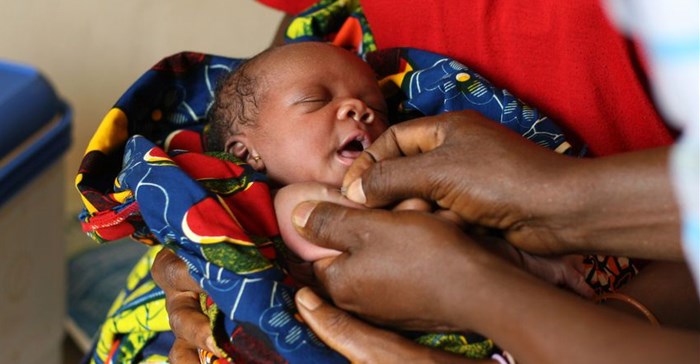
Subscribe & Follow
#AfricaMonth
In the news
Immunisation and saving lives
Today, life-saving new vaccines are being developed that are targeting all age groups, different populations and devastating disease outbreaks, such as Ebola and yellow fever. However, far more can be done to increase the impact of immunisation, and to address neglected and emerging disease threats through the development of new vaccines, especially in Africa.
The University of the Witwatersrand Faculty of Health Sciences will be hosting its 16th Prestigious Research Lecture on 1 November, 2017, entitled Wits and Vaccines: the impact and potential of vaccines for the African region. The event will profile the work of two Wits University’s internationally recognised, African-led research institutions working in the field of vaccinology, and outline the impact of vaccine research on regional and global health outcomes. It will be delivered by the co-directors of the Wits African Local Initiative for Vaccinology Expertise (Alive); Professor Shabir Madhi, professor of vaccinology in the Wits Faculty of Health Sciences and director of the Medical Research Council (MRC) - respiratory and meningeal pathogens research unit (RMPRU) and Professor Helen Rees, executive director of the Wits Reproductive Health and HIV Institute (Wits RHI).
Children under five
The research undertaken by the 21-year-old RMPRU has focused primarily on the leading causes of death in children under five years of age, namely pneumonia and diarrhoeal disease. Professor Madhi reveals: “The research has more recently been expanded to focus on vaccination of pregnant women to protect the mother, foetus and newborn. The first randomised placebo controlled trial showed that influenza vaccination of pregnant women provided approximately 50% protection in the mothers and their young infants against the illness.”
Because of the evidence provided in landmark studies undertaken by RMPRU, the World Health Organisation (WHO) has recommended that a number of new vaccines be included into public immunisation programmes of low-middle income countries. Included are the first randomised controlled trials on pneumococcal conjugate vaccine, which target the most common cause of death from pneumonia, and the rotavirus vaccine that targets the most common cause of diarrhoeal associated death in children. Both these studies were published in The New England Journal of Medicine.
“Largely from this local-led study, South Africa was the first country on the African continent to introduce these vaccines into its childhood public immunisation programme. In doing so,there's been a 40-50% reduction in all-cause pneumonia and diarrheal hospitalisation,” he says. “In addition, the lives of approximately 45,000 children have been saved since these vaccines were introduced into the public immunisation programme in 2009.”
In addition to the introduction of new vaccines, vaccine research also focuses on immunisation coverage of the target population. While a vaccine can protect an individual, high immunisation coverage is required to protect whole populations. Moreover, the Global Vaccine Action Plan adopted by the WHO in 2010 introduces the concept of immunisation across the lifespan to give population protection against a range of diseases beyond childhood.
HPV programme
Complementing the work of RMPRU, the Wits RHI, established in 1994, has focused on the introduction of vaccines into adolescents and older age groups. Wits RHI undertook a series of evaluation and acceptability studies prior to the introduction of human papillomavirus (HPV) vaccines to South Africa in 2014, The vaccines have been successfully introducer to nine and 10 year olds through the Department of Health's school's immunisation programme. Wits RHI is now exploring the impact of HPV vaccines on the epidemiology of HPV and its potential impact on the prevention of a range of HPV-related cancers.
“There is a growing interest in adding other vaccines aimed at protecting adolescents and young adults. In this lecture, we will explore what else could be offered as part of an adolescent vaccine platform, and present on-going work on the development of new vaccines for other sexually transmitted diseases including herpes simplex vaccines, gonorrhoea and HIV,” explains Rees.
Outbreaks
While new vaccines are being developed that are targeting all age groups and different populations, the threat of emerging pathogens especially in the African region has also created urgent calls for the accelerated development of vaccines that can be used to prevent potentially devastating disease outbreaks. The Wits RHI has, for many years, been working with the WHO and Global Alliance for Vaccines and Immunisation (GAVI) to assist in the development of global and regional policies and priorities for new vaccines.
Related
Stay informed about vaccine safety for the well-being of your child, by Medshield 17 Dec 2024 Congo launches its first mpox vaccination campaign 8 Oct 2024 Wits University land sale to transform students' futures 19 Sep 2024 Netflix and Wits University announce creative equity grant 31 Jul 2024 Caesarean births: South Africa’s rates are too high – they can be dangerous for mothers and babies 27 May 2024 Wits students set up Palestinian solidarity encampment 16 May 2024











